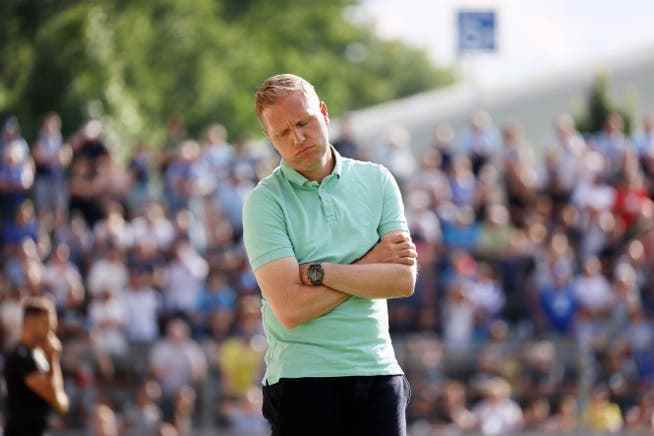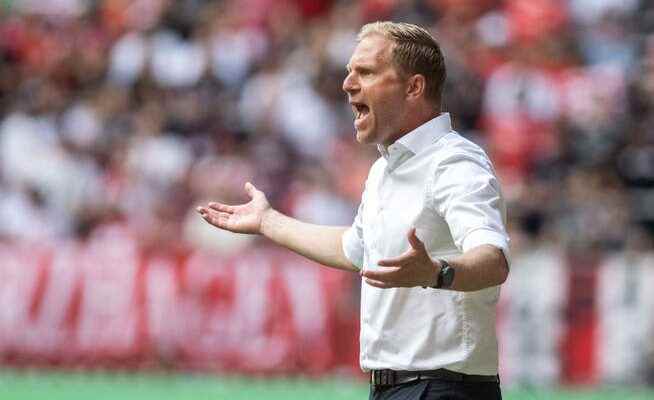They immediately felt the harshness of a nostalgic football league: Forte has already been dismissed in Bielefeld, Schneider is waiting for their first victory with Fürth, and Stilz says in Regensburg about the German enthusiasm: “It’s not exaggerated – these are honest feelings.”
The directness and clarity of communication is new to him: Marc Schneider as Greuther Fürth coach.
Last Sunday Swiss coach Marc Schneider suffered another defeat, Greuther Fürth – Kaiserslautern 1:3. And then the opposing coach said at the press conference without being asked: «I think that in Fürth it is well advised to give your colleague your trust. Marc, I hope to see you again soon.”
“I think that in Fürth it’s a good idea to give your colleague your confidence”: Kaiserslautern coach Dirk Schuster after the victory in Fürth last Sunday (from 2:48 a.m.).
That’s how it works. If a professional reunion is not a matter of course. Schneider has been training Greuther Fürth in the second Bundesliga for less than three months and needs encouragement from his colleagues.
In Bielefeld, Uli Forte experienced the hardship of business, the brevity of the moment
The second-highest German football league started in July with three Swiss players in central positions: with Schneider in Fürth; with Uli Forte as trainer of Arminia Bielefeld, with Roger Stilz as managing director sport of Jahn Regensburg.
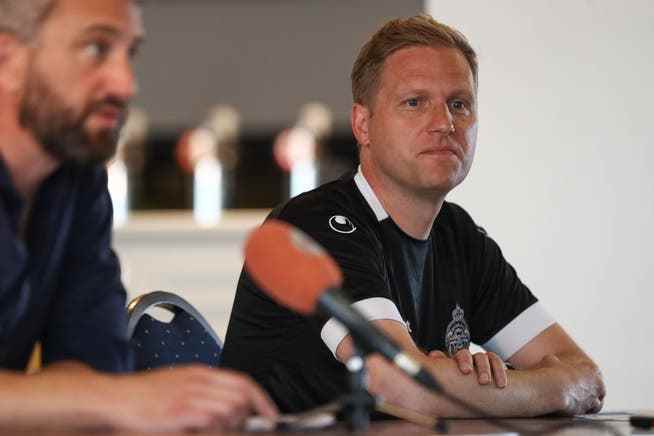
Formerly side by side, today opponents in the second Bundesliga: Roger Stilz in June 2021 as sports director of Waasland-Beveren, Marc Schneider (right) as coach.
And because everything is connected in the world of football, Stilz shares a history with both of them. In 2021, he worked with Schneider in Belgium at Waasland-Beveren, and two decades ago, he regularly drove with Forte from the University of Zurich to Kriens in an orange VW for training. They were students and NLB footballers, nobody thought they would meet in a prestigious foreign league.
Until a month ago Bielefeld and Regensburg met, Forte against Stilz, 0:3.
A few days later, Forte looked happily into the camera in a small Swiss media group and said: “If you ask me like that, I’m clearly at the peak of my career at the moment.”
Forte has only been training Arminia since June, a dream had come true, finally a job abroad, in an environment where football is the number one topic, “from morning to evening, in all shifts, whether with the little boy, who in the kindergarten, or with the grandmother who reads the newspapers in the café».
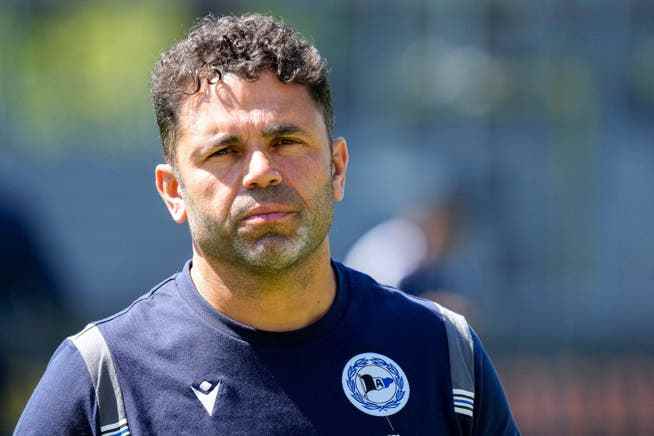
Four league games, four defeats: A week ago, Uli Forte had to leave Arminia Bielefeld again.
Last Thursday, the newspapers reported that Forte had been sacked after two more defeats. Four championship games, four defeats. “The exemption hurts,” said Forte. The media calculated how few coaches had been fired so quickly. The toughness of the business, the brevity of the moment.
Forte had to leave so early that there was hardly any time to get to know him. “Ulrich Massimo, called Uli”, the “Süddeutsche Zeitung” wrote at the beginning, as if she still had to find her way with this name. Forte had said in the Swiss media round that not the rearmost and last knew him.
What helped in the beginning: the shared past with Urs Fischer from Union Berlin
As a coach, Schneider doesn’t even have cup titles like Forte (with GC and FC Zurich). The people in Fürth didn’t know who he was, says Schneider, but: “Why should they know that?” Before that he had worked as a trainer in Thun and Beveren. What helped in public perception: the shared past with Urs Fischer, who has been surprising at Union Berlin for years. Schneider was once Fischer’s assistant in Thun, he was often asked about him, “and because Urs does it so well, it helped me to gain a foothold”.
Still the best known was Stilz. The East Swiss have a long history in Germany, when they speak they switch back and forth between dialect and Standard German. In 2004 he moved to Hamburg to study German and played for the regional league club Altona 93. Stilz was always a passionate soccer player, but during his student years in Hamburg he was no less likely to be at concerts than in the stadium. The closest point of contact with big football in the city was Raphael Wicky, the Bundesliga professional at Hamburger SV. Stilz met him in the university café and they became friends. “I took detours and wasn’t always in the same cake,” says Stilz, “everything had its time, it feels right.”
With his career, he is not a typical Bundesliga manager, in the second division there are sports bosses like Klaus Allofs (Fortuna Düsseldorf) and Dieter Hecking (Nuremberg); or also: Rachid Azzouzi and Samir Arabi, who employed tailors and fortes in Fürth and Bielefeld. But Stilz also established and maintained his network for a decade and a half, he was an assistant coach at HSV and in Nuremberg, head of the youth academy at FC St. Pauli. He acquired the highest coaching license and attended the same course as the current Bundesliga top coaches Julian Nagelsmann (FC Bayern) and Domenico Tedesco (Leipzig).
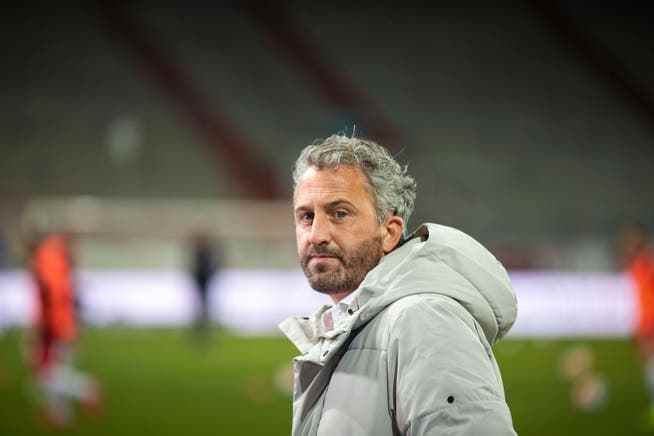
When he wasn’t playing himself, he was no less likely to be at concerts than in the football stadium: Roger Stilz, today’s sporting director of SSV Jahn Regensburg.
Over the years, Stilz has developed a feeling for this deep enthusiasm for football in German cities, he is no longer simply amazed that children and grandparents share the same passion. “My father is Swabian, from Heilbronn,” he says in High German, “my mom comes from Goldach in Eastern Switzerland,” he says in Swiss German. In his childhood he felt “extremely” Swiss, “after all these years I feel half-half in Germany”, but: “I keep finding myself still finding this identification with football a little unrealistic in this country. Sometimes it seems a bit exaggerated to us Swiss. But it’s not an exaggeration – it’s an honest feeling.”
Once “der Jahn” was so indebted that the city turned off the club’s electricity
And so it felt right to return to the country with this passion – a German cake, but different. At the end of 2021, Stilz moved from Beveren to the second Bundesliga to Jahn Regensburg, a club that has almost nothing in common with Arminia Bielefeld apart from being in the league. “Der Jahn”, as the club is called, is not always the talk of the day, it does not have this deep anchoring, about a decade and a half ago it was so heavily in debt that the city turned off its electricity. When he was promoted to the second Bundesliga in 2017, nobody took him seriously.
In the meantime, the club has arrived in this league, which is met with huge interest because it is so steeped in nostalgia, thanks to clubs like HSV, Düsseldorf, Nuremberg and St. Pauli. Regensburg has found respect and identification – and has remained a club where one player does not earn four times more than the other, says Stilz.
There is something that Stilz, Forte and Schneider have in common: they came to the club as outsiders, so to speak, in structures that had grown without them. One of Forte’s assistants was already with Arminia Bielefeld when the Swiss came, and the goalie coach even ended last season as interim head coach. No easy constellations, the newcomers have to conquer the place, which is perhaps easier for a managing director than for a coach because he is not measured overnight in terms of victory and defeat.
“A type of football that you can always recognize – that’s what many clubs want, and Regensburg did it well”: Roger Stilz at the presentation as Managing Director Sport at the end of 2021.
What Stilz found interesting after his years of apprenticeship and travel at Regensburg: how clearly the game philosophy is carried out, “even in weak phases. Always pressing, always running high. It wasn’t always easy because the club also played against relegation. Certain teams do it when things are going well – and as soon as they get full, they stop pressing.”
Last weekend Regensburg promptly got the hut full – 0:6 against Karlsruhe. It takes courage to do something like this, says Stilz, “but Regensburg does it quite well, and I’m brave too”.
Fürth’s Bundesliga record: 34 games, 28 goals conceded, 3 wins
Schneider also has the style he wants to pull off, the “Süddeutsche Zeitung” wrote on Wednesday that he stands for “offensive football”, but: “The Swiss idea is designed for teams that are at peace with themselves. When the foundation is in place, Schneider can put the roof on top; but with the people of Fürth you don’t know whether it’s raining because the bricks aren’t sitting properly – or whether the whole house has a construction fault.»
Like Bielefeld, Fürth were relegated from the Bundesliga last season, bottom of the table, with just three wins and 28 goals from 34 games. The team has been completely renewed, but the lack of success has remained, as have the general expectations – it looks like a design flaw. “You have to be satisfied with less again so that you can be satisfied at all,” said Schneider in a conversation last week.
Schneider doesn’t even want to judge whether Greuther Fürth is the highlight of his career, “that wouldn’t do FC Thun justice”, the club from his homeland that he coached until 2020, “back then, at the moment, that’s what it was for me largest».
In the Fürth football club, the ambiance is similar to that in Thun, “you see that each other is doing well”. The club has ambitions, of course, “but so far nobody has looked at me strangely and asked: ‘When will you win for the first time?'”
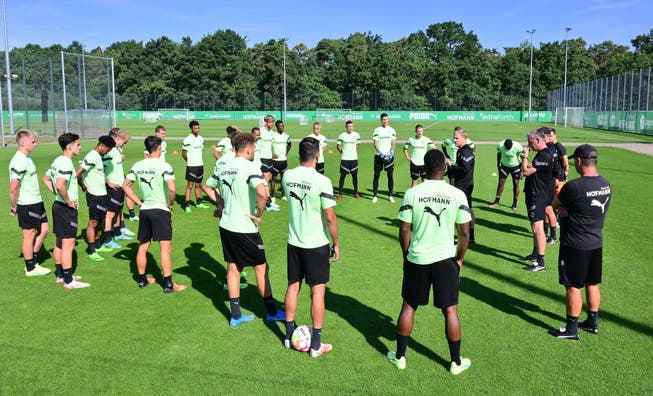
The first perseverance slogans come from the environment: Marc Schneider on Wednesday when addressing his team.
But the first perseverance slogans are sounding from the outside. “We’re not panicking,” says managing director Azzouzi, “it’s important now to stay with yourself.” Schneider is in the middle of a confirmation fight, he has never won, Fürth lost the cup game against a lower class and also the derby against Nuremberg. Schneider feels that everything that goes beyond the club’s internal sense of reality, the reporting, the reactions of the fans, the children, the grandmothers, “has a different impact than in Switzerland”. The “honest feelings” stop.
“The directness and clarity of how communication is communicated here is new to me – but I think I can handle it well,” says Schneider. “And what counts for me: knowing who I can rely on. Who and what is important?”
Who can you rely on?
Determined for the opposing coach.
